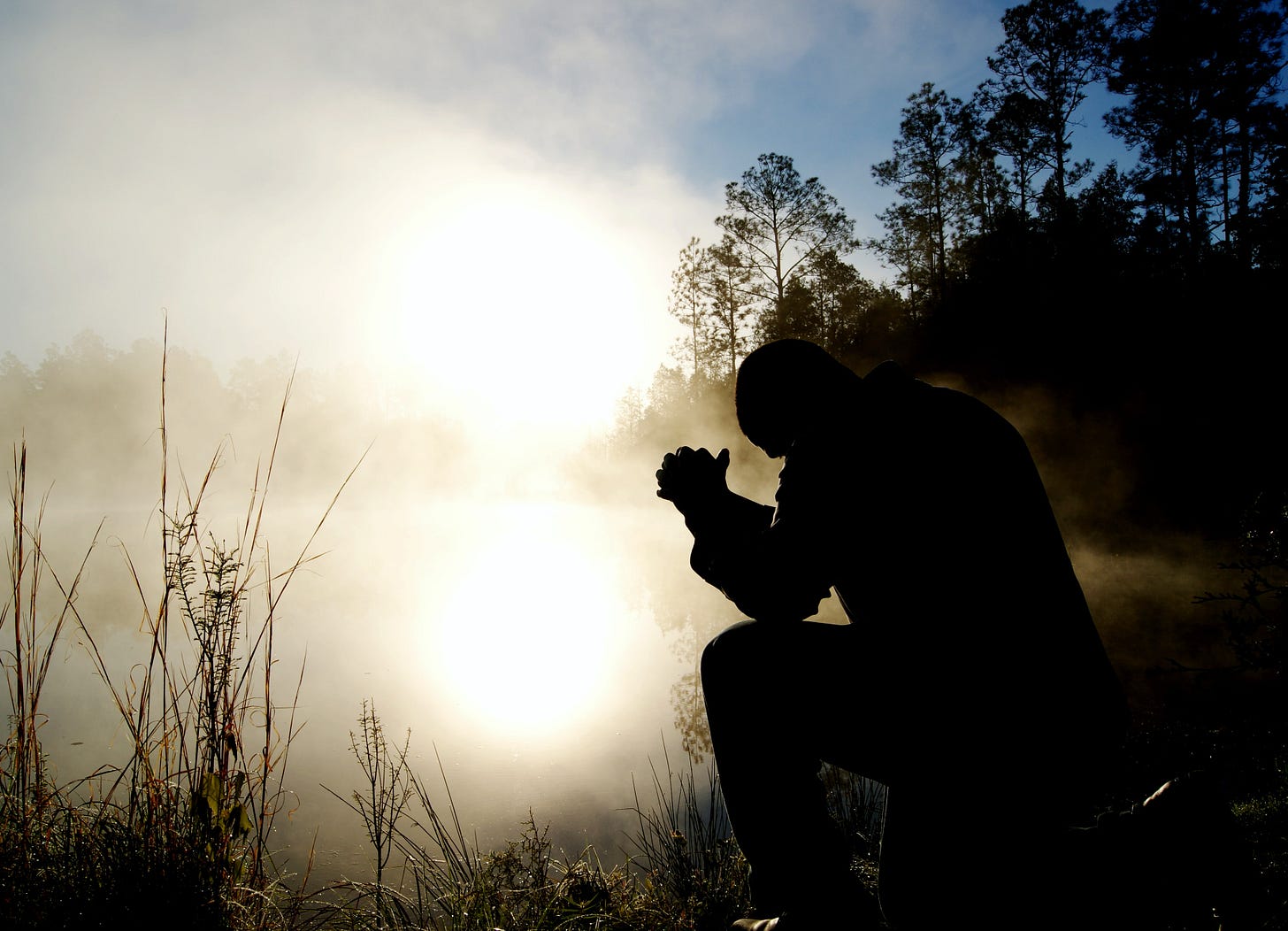Biblical Political Theology: What I Learned from 1 Timothy 2:1-4
It is when people receive the benefits of socio-political order and recognize their accountability to the natural law that they are best prepared for the message of salvation from the law.
As I have begun to write about the relationship between theology and politics, one Scriptural lesson I learned long ago keeps returning to my mind.
The lesson provided an answer to a long-standing, truly perennial debate: Should Christians prefer that the socio-political order disintegrate, or that it prosper? Following the first route, the disintegration of the socio-political order might provoke a sort of spiritual desperation that would lead people to seek hope outside of this life. Following the second route, we do wish temporal good for our neighbors, even if we also want them to seek and find eternal good.
In my ears, the voices of the proponents of disintegration were louder. They warned that cultural prosperity would lead to self-sufficiency, even among professing believers. The church is more genuine in following Christ when it is beset by persecution. The result of a church that lives in an intact social order will be hypocrisy, and those around it will not only be satisfied with their temporal lives but see little of value in the church.
My good college friend and I would go back and forth on this topic, and I realize now, it was partly because this was a topic on which there was little teaching. Politics was beyond the scope of the theologians. The question we were discussing was too specialized on the one hand and too broad on the other.
In fact, I think this question holds the key to the Christian life. A theology that does not speak to it is hardly a theology at all.
Timothean Thoughts
The passage from which I learned my political-theological lesson was 1 Timothy 2:1-4. It reads:
First of all, then, I urge that supplications, prayers, intercessions, and thanksgivings be made for all people, for kings and all who are in high positions, that we may lead a peaceful and quiet life, godly and dignified in every way. This is good, and it is pleasing in the sight of God our Savior, who desires all people to be saved and to come to the knowledge of the truth.
While there are interpretive questions, I read the passage as straightforwardly endorsing the preservation and prospering of the socio-political order, and for the sake of spiritual and eternal ends.
This is seen in both the object and content of Paul’s political prayer. Paul specifically encourages prayer, not only for all people but for political leaders, the civil magistrate. But the content of Paul’s prayer is instructive. Notably, it is not directly for the highest and ultimate end, the salvation of the king himself. The prayer is merely that the king would bring it about that Christians can lead “peaceful and quiet [lives], godly and dignified in every way.”
The prayer is modest. Too modest. I dare say that many Christians would think that Paul is thinking very small here. To live peaceful and quiet lives? Where is the warfare with the world and the breaking in of Christ’s kingdom? Where is the ultimate end of salvation for people and active evangelization on Christians’ part?
We could add the worry that, if Christians were able to live peaceful and quiet lives, they might grow self-satisfied and not see the need to share the news of salvation. Likewise, their countrymen, not Christian, may find themselves also able to live peaceful and quiet lives, and in their temporal happiness see no need of eternal salvation.
But in this passage, no such anxiety is present. In fact, Paul goes further. “This is good, and it is pleasing in the eyes of God our Savior.” Admittedly, talk of salvation is coming. But I want to observe when and where we see God’s blessing; when in this passage does God say what he said of creation at the end of each creation day, “It is good”? He says it of Christians simply living peaceful and quiet lives under political conditions that do not include persecution, prior to the salvation of anyone new.
Here, we see the general theological question of the relation between nature and grace arising. How can fallen nature, and fallen political orders, be good, even as, without any further action on God’s part, they end merely in damnation?
Much depends on the relationship of the following part of the passage concerning salvation. Perhaps Paul is really only endorsing fallen political order insofar as it is instrumental to salvation.
But that would be to ignore the order of Paul’s concern. He does not say that there is really only one thing that is good, namely, the ultimate thing, the salvation of people. Quite on the contrary, he says that there is something else that is good, namely, a penultimate thing, the functioning and flourishing of human social order in this life.
I remember learning the word “penultimate” from Lemony Snicket in the, yes, penultimate book of his A Series of Unfortunate Events: The Penultimate Peril. But I learned its theological use from Dietrich Bonhoeffer, in his discussion of “the penultimate things,” in his theological Ethics, written from prison in a Nazi concentration camp.
Bonhoeffer distinguishes the realm of ultimate things, and the ultimate end of human life, from the realm of penultimate things, and a penultimate end of human life. The ultimate end of human life is union with God in eternal life through Christ’s redemption of man, and the realm of ultimate things is the realm of salvation and the seeking of eternal life. The penultimate end of human life is our temporal good, a functioning and flourishing human existence in our temporal and natural state, the penultimate realm of the created, natural order.
But Bonhoeffer observes a temptation among Christians not only to subordinate the temporal to the eternal but to denigrate the temporal in order to exalt the eternal.
In a time of incredible social unrest, moral breakdown, and persecution, Bonhoeffer observed that the temporal realm seems merely instrumental until it is taken to a concentration camp, enslaved, and gassed. It’s when you’re walking into a gas chamber that you begin to think there might be some value in life this side of eternity. Perhaps there is a better social order than one that involves sending innocent people into gas chambers alive. Perhaps.
As Bonhoeffer explains, the temporal order does indeed serve the eternal. The penultimate is ordered to the ultimate. But this is not at the expense of the penultimate. In fact, it is by acknowledging fully the goodness of the temporal that the temporal serves the eternal.
Practical Penultimacy
What do the different understandings of the penultimate and the ultimate look like in practice?
Take, for example, education. One common Christian strategy with regard to education is to send children to public schools in order to be “salt and light.” Participating in the existing educational institutions is taken to be a means of evangelism, and concern about the quality or the content of public schooling is likely to lead to Christians hiding their light under a bushel.
However, in practice, this means that Christians don’t have a hand in directing the educational process itself. It is as if Christians have nothing to say on this penultimate thing. The non-Christians have that covered. The Christians are there merely to add some evangelism on top, along with some good deeds designed to elicit the question, “What is the hope you have within you?”
The same pattern is seen in Christian approaches to culture generally. The Christian’s role in the workplace is to do his job, do random acts of kindness, and take opportunities to evangelize as they present themselves. The Christian role in music is to make music that evangelizes by being explicitly Christian. A good Christian neighbor is one who evangelizes his neighbors. And so on.
In each case, there is a lack of interest in the penultimate things and a sort of jumping to the ultimate things, instrumentalizing the penultimate, doing a sort of “Jesus juke” in every area of culture and common human interaction. On this view, Christians are literally to be so heavenly-minded that they don’t believe there’s even such a thing as “earthly good.”
On the contrary, says the apostle Paul, the penultimate things are “good” and “pleasing in the eyes of God our Savior.”
Among these penultimate things is, or perhaps the sum of these penultimate things is, the socio-political order. If we imagined Christians doing their duty in each of the autonomous domains of human life, the sum of that would be a functioning and flourishing polis. Not necessarily a Christian nation, but a good and righteous city of man.
Now we are prepared to talk about the ultimate things. For indeed, Paul goes on to say, “This is good, and it is pleasing in the sight of God our Savior, who desires all people to be saved and to come to the knowledge of the truth.” The ultimate end is not lost from view. This is not a Christian quietism or secularism that has no interest in ultimate and spiritual things. Rather, the penultimate serves the ultimate in its integrity and autonomy.
Preparatio Evangelium
It is by preserving and playing their role in a functioning and flourishing socio-political order that Christians provide a crucial preparatio evangelium. The doctrine of the preparatio evangelium derives from ancient Christian thought. For the Jews, the revelation to Israel, the Old Covenant, served as preparation for the gospel. For the Greeks and Romans, philosophy served as preparation for the gospel.
On the latter point, some will object, citing 1 Corinthians: “The Greeks seek wisdom, but we preach Christ crucified, foolishness to the Greeks.” But of course, we could make the same objection for the Jews. They had the Old Covenant, but many of them rejected Christ, preferring Pharisaical adherence to the Old Covenant to acceptance of the New.
Yet we know that Christ’s condemnation of the Pharisees was that, if they had listened to Moses, they would listen to him. The Old Covenant was, as such, preparation to hear Christ’s message and understand that he would die and rise again after three days. But hardness of heart prevented the most fervent “professors” of the Old Covenant from being so prepared. The same was arguably true of philosophy. The Greek seeking of wisdom that Paul condemns was like the Pharisaical adherence to the Old Covenant that Jesus condemned. True philosophy, true wisdom, led to Christ, as Justin Martyr and Augustine found (and many others since).
In the same way, a functioning and flourishing political order is a preparation for the gospel for the many people who benefit from it. Will some reject the gospel in self-satisfaction, on account of their ingratitude for the blessings of their socio-political conditions? Indeed. They are secular Pharisees, and woe to them! But objectively, functioning and flourishing socio-political community is a preparatio evangelium, one without which Christian witness is greatly hampered.
Christian Secular Conservatism
The implications of this approach to the penultimate and the ultimate things (which is, in principle, the proper approach to nature and grace) are many. They include many of the matters on which I have begun to advocate, but which are not always found together. On the one hand, they include an insistence on the value of the natural, the this-worldly, the secular, and in particular, of philosophy. On the other, they include social and political conservatism, of the sort that appreciates and understands the moral order of society and plays its part in preserving its fundamental institutions, the family, local community, just economic trade, and political authority.
Often, advocacy for the value of the secular and this-worldly action against Christian heavenly-mindedness comes from the Christian left. However, because of its inattention to nature and the foundational institutions of political society, the Christian left ends up ceding the public realm to philosophies that are destructive of political order, as when they argue that Christian morality on sex and family should not be imposed on the public square. Au contraire, Christian morality is not exclusively Christian morality, but as the natural law, it is binding upon and should be imposed, within prudential limits, on the public square.
Contrapositively, as I never tire of arguing, conservative Christians too often present their conservatism as exclusively biblical and distinctively Christian, and not often enough as reflective of the natural order. Instead, I urge a Christian, secular conservatism.
Christian conservatism, of course, is often criticized for putting a stumbling block to the gospel before our contemporaries. By tying Christianity to conservatism or the Republican party, Christian conservatives make it more difficult for people to hear the gospel free of baggage.
While there are situations in which that allegation may be correct, in general, I want to argue a thesis approximately opposite that one.
The preservation and maintenance of the social order, social and political conservatism in that sense, is a necessary preparation for the gospel. It is when people receive the benefits of the socio-political order and recognize their accountability to the natural moral law that it reflects that they are best prepared for the message of salvation from the curse of the law through the grace of Jesus Christ.
In fact, it is the disintegration of this moral order that proves a stumbling block to unbelievers, who now think that any god who does not abide by secular, liberal morality is evil. They are not better served by the suggestion that God is compatible with secular, liberal morality, except where secular, liberal morality is reflective of the natural law itself. Were they not beholden to such a flawed morality, they might recognize that they are not righteous lawgivers but unrighteous sinners, in need of grace.
Should Christians pray for and pursue the disintegration of the social order or its preservation? I have argued the latter. And this answer leads to an expansive Christian ethic: Secular good works in the many autonomous spheres of human activity; preservation, revitalization, and improvement of the socio-political order; and evangelism in the context of a world so prepared for the gospel. Go and do likewise.











I read 1 Timothy 2:1-4 exactly as you. There are a few things I could add.
From an unpublished piece on Political Theology
I wish that I had made a practice of keeping printed or electronic copies of everything I read long ago. For I read decades ago that Baptists in the middle American colonies complained that the outbreak of the Revolutionary War had cut short a local revival. Nevertheless, it is historically evident that the Revolution devastated, at least at a formal ecclesiastical level, the spiritual landscape of America.
This makes perfect logic. Wars and rumors of wars have a habit of diverting minds from the Holy to more prosaic and immediate concerns and this with a less than a gracious mindset.
The point at which the influence of Christianity upon Europe began to wane was marked by the Thirty Years War (1618–48), the culmination of other ongoing sectarian struggles and strife (i.e., French Wars of Religion (1562–1598); Eighty Years’ War in the Netherlands, (1568–1648); English Civil War (1642–1651)). Even during the armistices between Catholic Spain and Holland’s Calvinists, Calvinists exploited the external peace to oppress, expel, and kill those with Arminian beliefs within their jurisdiction, the most famous of these being Hugo Grotius.
As George Whitefield often declared, God works through (instrumental) means. Thus, if there are conflicts, let alone conflicts in which self-identifying Christians are even participants, it is not reasonable to expect that outside interlocutors will find Christianity all that attractive.
Great article. One difficulty seems to come in your last paragraph, where the penultimate and the ultimate are ordered. It seems to imply evangelism only after a sufficiently prepared social order. I don’t think this is what you mean, but it may be worth exploring how evangelism can find its place despite the social order. Maybe this involves a 3 worlds framework like Aaron Wren has posited. I.e. the 3 worlds are the penultimate context for the same ultimate end. The ultimate end has a different flavor depending on the “world”.
Just a few quick notes. Thanks for writing!